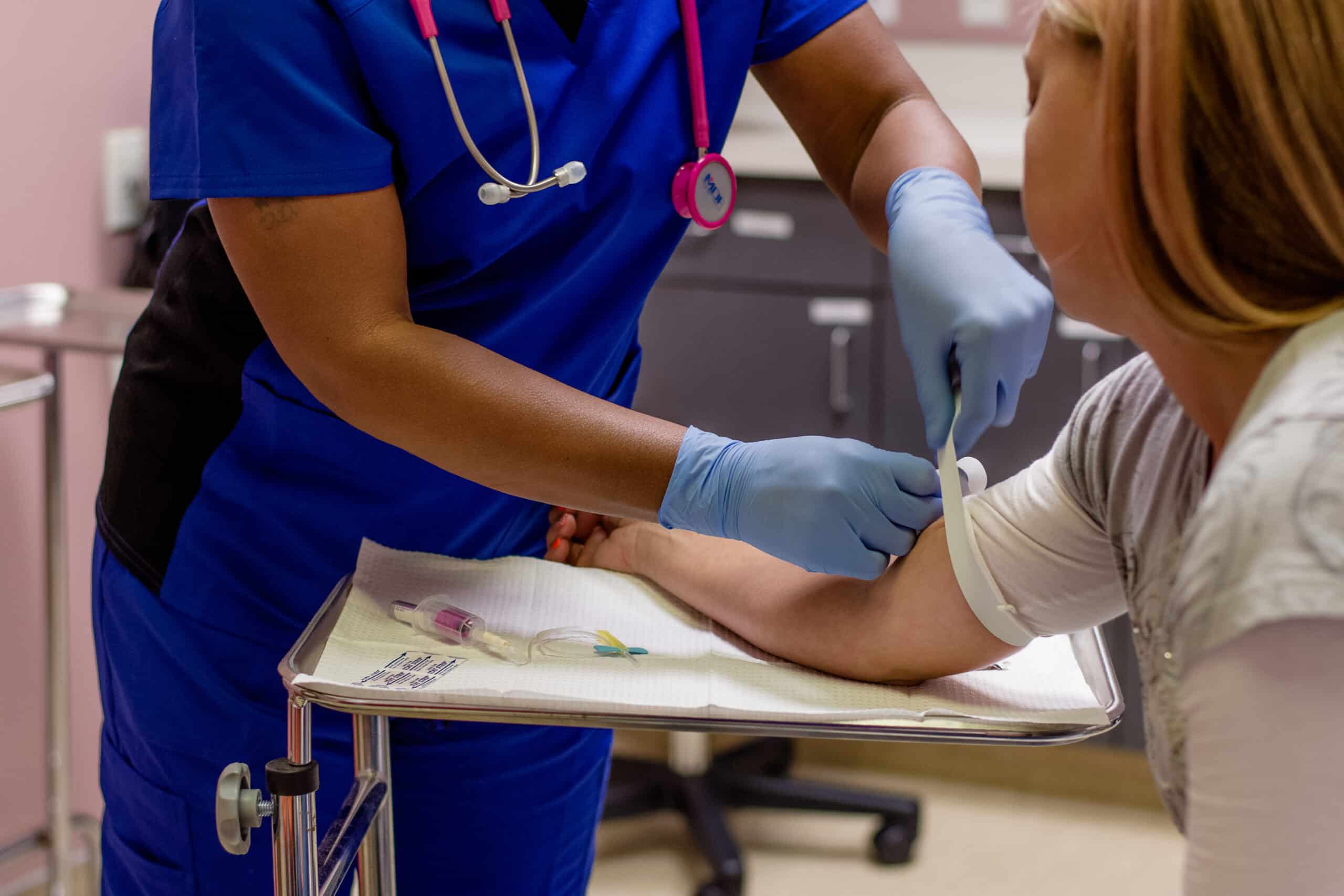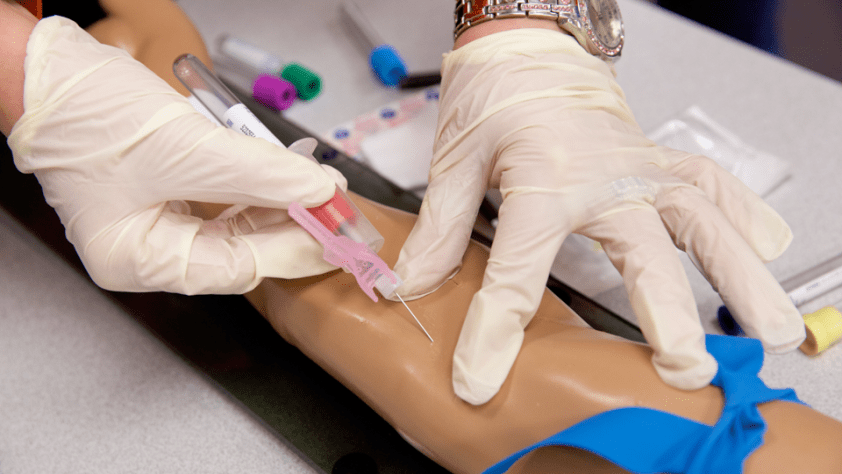10 Must-Have Skills You’ll Learn in a Phlebotomy school
Wiki Article
The Path to Accreditation: Recognizing the Phlebotomy Educating Training Course Trip and Its Importance
As you take into consideration the course to qualification in phlebotomy, it's crucial to comprehend the function you'll play in healthcare. Your training will cover essential abilities, from blood collection methods to patient interaction.
The Duty of Phlebotomists in Health Care
Phlebotomists play an important duty in the health care system, serving as the vital link in between individuals and important diagnostic screening. You'll carry out blood attracts, making certain samples are accumulated precisely and securely. Your experience assists in detecting medical problems, keeping an eye on health, and assisting treatment decisions.In your everyday communications, you'll need to establish depend on with clients, making them really feel comfortable throughout what may be a demanding experience. You are accountable for labeling and taking care of examples very carefully to stop contamination or mistakes, which might influence examination results.
Beyond this, you'll typically work together with medical professionals and nurses, connecting vital details about people' problems. Your role is basic in preserving the workflow in medical care settings, guaranteeing prompt and exact results. By understanding your skills, you add meaningfully to patient treatment, making you an important component of the medical group. Accepting this duty is key to your success as a phlebotomist.
Overview of Phlebotomy Training Programs
When discovering phlebotomy training programs, you'll locate numerous kinds created to fit different schedules and learning designs. Each program aids you create necessary abilities like blood collection and client interaction. Understanding these options is vital to picking the ideal path for your career.Sorts Of Educating Programs
A number of types of training programs are available for those looking to come to be skillful in phlebotomy. You can select from certificate programs, which generally last a few months and concentrate on necessary skills. There are also diploma programs that give an even more extensive education, often lasting approximately a year. If you're trying to find a deeper understanding, an associate level in an associated area may be the appropriate fit. On the internet courses use flexibility for those stabilizing work or family members commitments, permitting you to examine at your own speed. Additionally, some medical facilities and clinics supply on-the-job training programs, offering sensible experience while you discover. Whatever course you select, each program intends to equip you with the essential skills for an effective phlebotomy profession.
Trick Skills Developed
Understanding phlebotomy calls for a set of crucial abilities that are developed with detailed training programs. You'll learn technical skills like appropriate capillary choice, needle insertion, and blood collection techniques. These hands-on methods assure you can perform procedures securely and efficiently. Furthermore, communication skills are essential; you'll require to interact with clients, clarify procedures, and placed them comfortable. Understanding anatomy and physiology is crucial, as well, as it assists you find capillaries and understand the body's reaction to blood draws. Lastly, you'll obtain expertise of safety and security methods and infection control, ensuring you maintain a sterile environment. Each of these skills is crucial for your success as a qualified phlebotomist, making you a beneficial possession in any medical care setting.Secret Components of a Phlebotomy Program
In a phlebotomy training course, you'll concentrate on crucial topics that prepared for your future profession. You'll take part in hands-on training that allows you to use what you have actually discovered in real-world setups. Both the curriculum and functional experience are vital for your success as a phlebotomist.Curriculum Overview
While going after a phlebotomy training program, you'll experience a curriculum developed to outfit you with fundamental skills and expertise. Phlebotomy school. This curriculum usually consists of anatomy and physiology, concentrating on the blood circulation system and understanding blood elements. You'll additionally learn about various kinds of blood collection techniques, consisting of venipuncture and capillary slit techniquesFurthermore, infection control and security methods are important parts, ensuring you understand just how to keep a clean and sterile environment. You'll examine patient communication, emphasizing communication and compassion, which are critical for alleviating person anxiousness. Moral and legal considerations will certainly be resolved, preparing you for real-world responsibilities. This fundamental expertise will enable you to excel as a phlebotomist and give quality care in scientific setups.
Hands-On Training Experience
Getting hands-on experience is a vital component of your phlebotomy training program. This sensible training allows you to use what you've found out in a real-world setup, enhancing your skills and confidence. You'll practice venipuncture methods, find out just how to handle various kinds of specimens, and get knowledgeable about the devices used in the area. Under the guidance of experienced teachers, you'll fine-tune your skills, ensuring you're planned for any kind of circumstance you might face.Furthermore, you'll obtain the opportunity to engage with patients, which is crucial for creating Discover More your interaction abilities. This combination of technological efficiency and social skills is vital for your success as a licensed phlebotomist. Inevitably, hands-on training is where theory satisfies method, strengthening your knowledge and preparedness for certification.
Qualification and Licensing Requirements
Before you can start your occupation in phlebotomy, it is vital to recognize the accreditation and licensing demands that differ by state. Many states require phlebotomists to hold a qualification from an acknowledged organization, such as the National Phlebotomy Association or the American Culture for Medical Pathology. These accreditations usually include passing a test that evaluates your understanding and skills in the area.In enhancement to qualification, some states have particular licensing needs. You may require to finish a specific number of hours in medical method, send proof of training, or go through a background check. It is essential to investigate your state's guidelines to ensure you meet all required requirements.
Staying informed concerning these demands not just assists you protect a placement yet additionally boosts your trustworthiness as an expert. By satisfying these requirements, you'll be well on your way to a successful job in phlebotomy.
Hands-On Training and Practical Experience
Hands-on training and sensible experience are crucial parts of your phlebotomy education and learning, as they enable you to apply academic expertise in real-world circumstances. During your training, you'll engage in monitored venipuncture, find out appropriate techniques, and come to be acquainted with different blood collection equipment. This straight participation is vital for developing your self-confidence and sharpening your skills.You'll work very closely with knowledgeable experts that can assist you with the nuances of person interaction and example handling. Each practice not only enhances your understanding however also prepares you for the busy atmosphere of healthcare setups.
Additionally, several programs integrate medical turnings, enabling you to experience diverse setups, from medical facilities to outpatient facilities. This exposure aids you adjust to different obstacles and client demands, ensuring you're well-prepared for your future duty. Accept these possibilities, as they're important to becoming a skilled and thoughtful phlebotomist.
Challenges Dealt With Throughout Training
While getting hands-on experience is necessary, it's important to acknowledge the obstacles that can arise during your phlebotomy training. Additionally, understanding the abilities needed for blood attracts takes technique; you might have a hard time with strategy at first.Time management can additionally be an obstacle, as harmonizing theory, sensible sessions, and individual dedications can feel challenging. You may face differing learning speeds amongst your peers, resulting in feelings of self-doubt if you believe you're dropping behind. Lastly, adjusting to the various individualities of teachers can be tough, as each might have an one-of-a-kind training Extra resources design.
Acknowledging these challenges early can prepare you for success and assist you develop resilience throughout your training journey.
Job Opportunities After Qualification

As you obtain experience, you may also think about concentrating on areas like pediatric or senior citizen phlebotomy, accommodating particular person requirements. Some phlebotomists pick to advance their occupations by becoming lab technicians or going after more education in health care areas.
Additionally, your accreditation can bring about roles in training or monitoring brand-new phlebotomists, allowing you to share your understanding. With the health care sector continually growing, your abilities will certainly constantly be in demand, leading the way for a stable and satisfying occupation. Welcome the opportunities waiting on you!
Often Asked Inquiries
What Is the Regular Duration of a Phlebotomy Training Program?
Phlebotomy training courses normally last around 4 to 8 weeks. You'll participate in hands-on practice, like this classroom direction, and on the internet discovering. Finishing this training prepares you for qualification and a rewarding career in healthcare.Are Online Phlebotomy Courses Available?
Yes, online phlebotomy programs are offered. They provide versatility and benefit, enabling you to examine at your very own speed. Just confirm the program is certified to satisfy accreditation requirements and acquire important skills for your career.Just How Much Does Phlebotomy Training Typically Cost?
Phlebotomy training typically costs in between $700 and $2,500, relying on the program and place. You ought to think about elements like course size, consisted of materials, and hands-on experience when choosing the right training for you.What Are Typical Prerequisites for Phlebotomy Training?
Typical prerequisites for phlebotomy training usually include a secondary school diploma or GED, booster shots, and a background check. Some programs might also require standard health care knowledge or accreditations, ensuring you're gotten ready for hands-on training.Can I Work While Finishing My Phlebotomy Training?
Yes, you can function while completing your phlebotomy training. Several trainees equilibrium jobs with their researches, but ensure to manage your time properly to guarantee you satisfy both job and training commitments efficiently.Report this wiki page